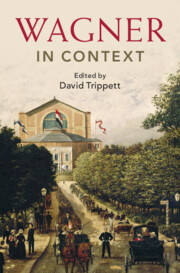Book contents
- Wagner in Context
- Composers in Context
- Wagner in Context
- Copyright page
- Contents
- Illustrations
- Musical Examples
- Contributors
- Acknowledgements
- Abbreviations
- Introduction
- I Place
- II People
- III Politics, Ideas, and Bodies
- Chapter 15 National Politics
- Chapter 16 Revolutionary Politics
- Chapter 17 World-Drama: Wagner’s Hegelian Heritage
- Chapter 18 Towards an ‘Ideal’ Feminine
- Chapter 19 Health and Wellness
- Chapter 20 Sexuality and Social Mores
- Chapter 21 Sentient Bodies
- Chapter 22 Racial Theory
- IV Life, Language, and the Ancient World
- V Music and Performance
- VI Reception
- Further Reading
- Select Bibliography
- Index
Chapter 22 - Racial Theory
from III - Politics, Ideas, and Bodies
Published online by Cambridge University Press: 14 March 2024
- Wagner in Context
- Composers in Context
- Wagner in Context
- Copyright page
- Contents
- Illustrations
- Musical Examples
- Contributors
- Acknowledgements
- Abbreviations
- Introduction
- I Place
- II People
- III Politics, Ideas, and Bodies
- Chapter 15 National Politics
- Chapter 16 Revolutionary Politics
- Chapter 17 World-Drama: Wagner’s Hegelian Heritage
- Chapter 18 Towards an ‘Ideal’ Feminine
- Chapter 19 Health and Wellness
- Chapter 20 Sexuality and Social Mores
- Chapter 21 Sentient Bodies
- Chapter 22 Racial Theory
- IV Life, Language, and the Ancient World
- V Music and Performance
- VI Reception
- Further Reading
- Select Bibliography
- Index
Summary
Richard Wagner’s musical and prose works are shot through with ideas, imagery, and speculation relating to race. Given the influence of racial theorising on almost every area of nineteenth-century European thought and culture, this is hardly surprising. Yet Wagner did not just absorb theories of race: he actively disseminated them, a fact that remains a troubling, if unavoidable part of his legacy. This chapter provides a selective overview of the history of scientific racism in Europe (especially Germany) from the Enlightenment era to the early twentieth century, focusing on the intersections of racial theory with aesthetics, comparative philology, and religious ideologies, including antisemitism. Special attention is devoted to Arthur de Gobineau’s influence on Wagner’s late essays, and the impact of those writings on the Bayreuth Circle, including Houston Stewart Chamberlain.
Information
- Type
- Chapter
- Information
- Wagner in Context , pp. 217 - 226Publisher: Cambridge University PressPrint publication year: 2024
